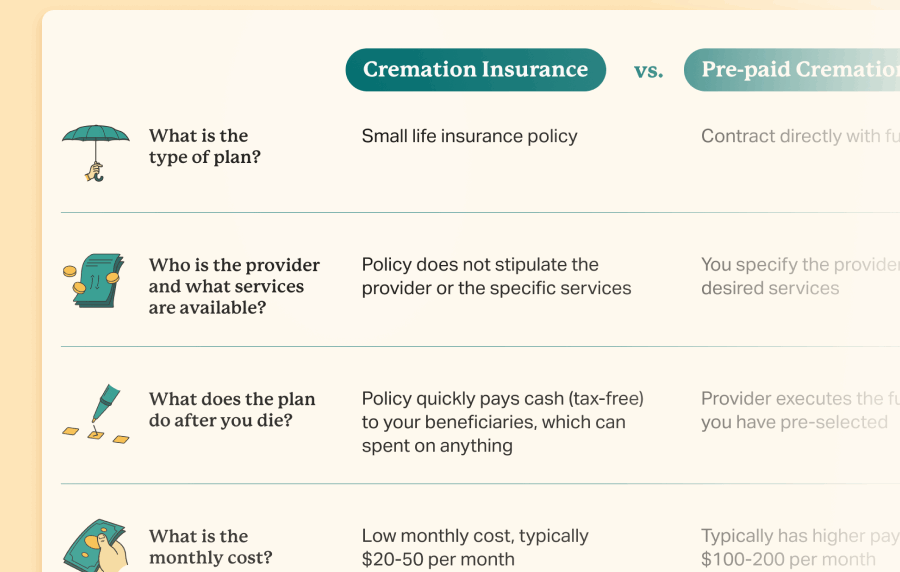Final Expense Insurance Vs. Life Insurance Coverage Comparison
It’s important to remember that the term “life insurance” is very general. It’s similar to the word “automobile.” Just as there are many different kinds of automobiles, there are also various types of life insurance, including term life, whole life, universal life, and burial insurance.
The ultimate goal of burial life insurance for seniors is to provide peace of mind, knowing that if you pass away, the policy will ensure your family isn’t saddled with the financial burden of unpaid final expenses.
Below is a table that outlines some of the unique features of a burial insurance policy compared to traditional life insurance plans.
How Does Burial Insurance Work?
Burial insurance is a simplified whole life insurance policy with a small death benefit — typically $50,000 and under — to cover the costs associated with funeral and burial expenses. The policy proceeds are paid out as a lump sum cash tax-free payment to your family members or a funeral home. The policyholder chooses the beneficiaries, who are typically their family and loved ones.
Like all forms of life insurance, the money can be spent with no restrictions. So if your loved ones don’t use all the money to cover your burial or cremation, the remaining amount is theirs to keep. Since it is a whole life policy, the rates will never increase, the policy won’t expire, and it will build cash value. Below are some other intricacies of the coverage:
- Premiums: The premiums are affordable since you only buy a small amount of coverage. In contrast, traditional life insurance plans offer large death benefits, which is why they typically cost much more.
- Requirements: You don’t have to be in good health to qualify. No medical exams are necessary, and seniors with pre-existing conditions can still obtain a new policy. Some plans are guaranteed acceptance because they don’t require you to answer health questions or complete an exam. Please note that guaranteed acceptance options will only refund your premiums if you die within the first two years. You must answer health questions to qualify for life insurance with no waiting period.
Who Needs Burial Insurance?
Not everyone needs a final expense policy. Some companies will tell you it’s a must-have for everyone, but that simply is not true.
There are a handful of instances when it’s worth it to purchase a burial life insurance policy, such as:
- You have no financial means to cover your burial expenses.
- There’s existing coverage, but it’s not enough to cover the cost of a funeral.
- You’d like to leave a little money behind for someone special as a gift.
- You want to pay off small debts, such as a car note or credit card bills.
You may find that a term policy better suits your needs (be sure to compare the differences between burial insurance vs term life insurance).
If you decide to buy a burial policy, be sure to compare multiple burial insurance providers before signing on the dotted line. Every company varies in terms of cost, underwriting, and whether or not there is a waiting period.
Who Needs Life Insurance?
Generally speaking, you should seek out a traditional life insurance policy if:
- You’re the primary breadwinner and would like to ensure your income is replaced so your dependents aren’t left destitute.
- Would like to pay off a mortgage or other large debt(s).
- Want to leave a substantial inheritance or gift to a loved one or charity?
- Estate taxes.
- Supplement your retirement (certain whole life or universal life policies can be used for this reason).
Alternative Ways To Pay For A Funeral
Burial insurance is an excellent way to pay for a funeral. However, there are other options to consider:
- Prepaid burial plan: A prepaid burial plan is not a form of insurance. You buy directly from a funeral home. Essentially, you fully design your funeral and then pay for it in one lump sum payment or make installments over several years.
- Set up a savings account: While less than ideal, you could also commit to putting money into a savings account to save up enough before you die. If you choose this option, be sure not to dip into those funds when a financial emergency arises. Otherwise, you won’t have the money to pay for your funeral.
- POD Account: A payable on death (POD) account is a special type of bank account in which you name beneficiaries who will receive the funds in the account upon your death. It’s also referred to as a Totten trust.
Regardless of your end-of-life planning option, stick with it so you don’t leave your loved ones with a hefty bill — the median cost of a funeral was $9,995 in 2023.
Frequently Asked Questions
Funeral insurance is an excellent option if you have no other financial means to pay for your end-of-life expenses. It can provide immediate peace of mind to ensure your surviving loved ones don’t have to come out of their own pockets to pay for your funeral.
However, you should consider life insurance if you will need help covering large, long-term expenses, such as paying for a mortgage or income replacement.
Burial insurance is life insurance. A funeral happens when a life ends, which is why insurance to cover final expenses is going to be a type of life insurance.
All forms of life insurance result in a payout of cash (tax-free) to the beneficiaries of your choice. There are no restrictions on how the money is spent. Your beneficiaries can use the life insurance money to pay for your burial or anything else.
There are two types of burial insurance: simplified issue and guaranteed issue. Simplified policies have health questions that, depending on your answers, determine whether you’re approved or declined. If approved, there will be no waiting period. Guaranteed issue policies, on the other hand, have no health questions. Since your approval is guaranteed, a two-year waiting period will apply. Death during the waiting period will result in a refund of your premiums.
- Nationally licensed life insurance agent with over 16 years of experience
- Personal annual production that puts him in the top .001% out of all life insurance agents in the nation.
Anthony Martin is a nationally licensed insurance expert with over 16 years of experience and has personally served over 10,000 clients with their life insurance needs. He frequently authors entrepreneurial and life insurance content for Forbes, Inc.com, Newsweek, Kiplinger, and Entreprenuer.com. Anthony has been consulted as an expert life insurance source for dozens of high-profile websites such as Forbes, Bankrate, Reuters, Fox Business, CNBC, Investopedia, Insurance.com, Yahoo Finance, and many more.
- Nationally licensed life insurance agent with over 20 years of experience
- Best selling Amazon author.
Jeff Root is a nationally licensed life insurance expert with over 20 years of experience. He has personally helped over 3000 clients with their life insurance needs. Jeff is a best-selling Amazon author and the managing partner of a highly successful insurance brokerage that manages over 2,500 licensed insurance agents across the USA. He has been a featured life insurance source for prestigious websites such as Forbes, Bloomberg, MarketWatch, Nerdwallet, and many more.
- Nationally licensed life insurance agent with over 15 years of experience
- Best selling Amazon author of five insurance sales books.
David Duford is a nationally licensed insurance expert with over 15 years of experience. He has personally helped more than 15,000 clients buy life insurance. David has been featured as an expert source for highly authoritative publications such as A.M. Best and Insurancenewsnet. He also runs one of the largest Youtube channels to help aspiring insurance agents serve their clients better.
- Nationally licensed life insurance agent with over 20 years of experience
- Best selling Amazon author.
Jeff Root is a nationally licensed life insurance expert with over 20 years of experience. He has personally helped over 3000 clients with their life insurance needs. Jeff is a best-selling Amazon author and the managing partner of a highly successful insurance brokerage that manages over 2,500 licensed insurance agents across the USA. He has been a featured life insurance source for prestigious websites such as Forbes, Bloomberg, MarketWatch, Nerdwallet, and many more.
- Nationally licensed life insurance agent with over 15 years of experience
- Best selling Amazon author of five insurance sales books.
David Duford is a nationally licensed insurance expert with over 15 years of experience. He has personally helped more than 15,000 clients buy life insurance. David has been featured as an expert source for highly authoritative publications such as A.M. Best and Insurancenewsnet. He also runs one of the largest Youtube channels to help aspiring insurance agents serve their clients better.
Choice Mutual often cites third-party websites to provide context and verification for specific claims made in our work. We only link to authoritative websites that provide accurate information. You can learn more about our editorial standards, which guide our mission of delivering factual and impartial content.
-
payable on death. https://www.investopedia.com/terms/p/payableondeath.asp
-
$9,995 in 2023.. https://nfda.org/news/media-center/nfda-news-releases/id/8134/2023-nfda-general-price-list-study-shows-inflation-increasing-faster-than-the-cost-of-a-funeral








